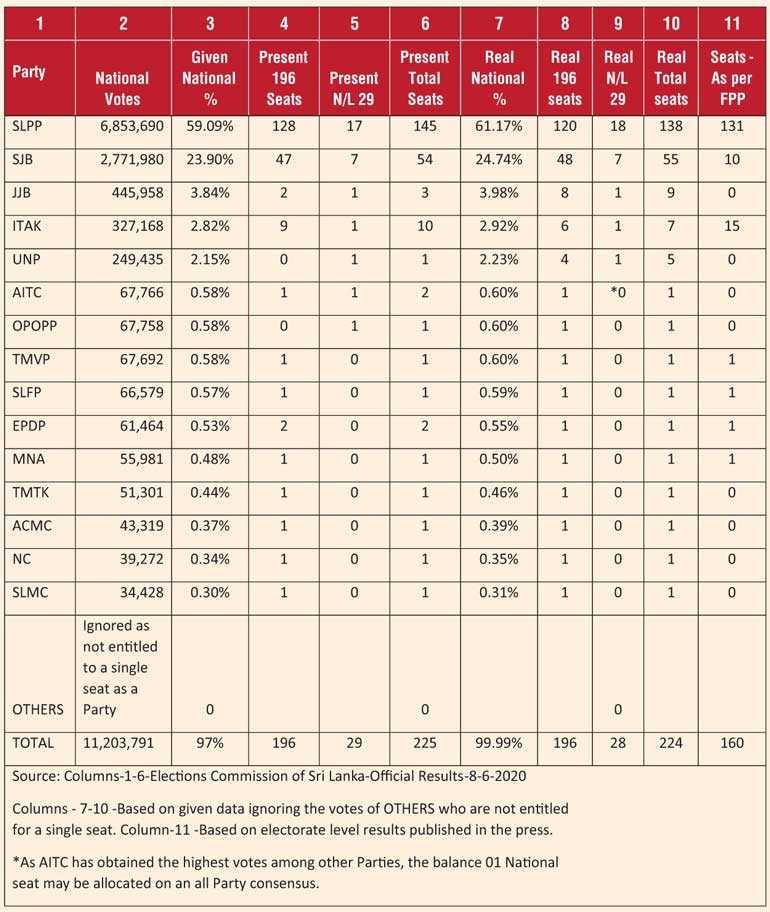Sunday Feb 15, 2026
Sunday Feb 15, 2026
Friday, 4 September 2020 00:10 - - {{hitsCtrl.values.hits}}

A recent statement issued by NJC appearing in the press, carried the following excerpt:
“We also strongly urge the Govt. to do away with the existing PR system of elections and revert to the  first-past-the post system (FPP) as it existed prior to 1978.”
first-past-the post system (FPP) as it existed prior to 1978.”
Since the General Election results continue to be compiled and announced on the basis of popular 160 electorates, the handy way to respond to the above statement would be to extrapolate the said FPP mechanism to the recent General Election result and compare the outcome (Column 11) with that obtained by applying PR arithmetic as per ‘Present’ (Column 6) and as per ‘Real’ (Column 10) as illustrated in the table.
In my recent article to the Press titled ‘Refine PR arithmetic and allocate seats for Parliament and Cabinet for a ‘Permanent Peoples’ Govt.’, I have highlighted the causes for the differences between Column 6 and 10 as distortions arising from:
22 Bonus Seats
5% minimum district vote requirement and 3)
The large number of votes going unaccounted in the 2nd round of seat determination on a District basis
I leave it to the proponents of the FPP system to arrive at their own conclusions on the seat allocation shown in Column 11.
Thanks to the existing PR Arithmetic (though distorted as mentioned above), the recent election brought some numerical sanity (Column 6) to the Parliament, avoiding the complete whitewash that would have occurred if the first-past-the-post system was in operation, as glaringly seen in Column 11. It is pertinent to mention that during the recent election campaign, a senior ex-Minister went on record that if the first-past-the-post system was implemented, their party will easily win all the electorates meaning that nearly 95% of MPs would come from a single party. A somewhat similar result was chalked in the Parliamentary Elections in 1970 and 1977. The kind of democracy that prevailed during those time periods is no secret to the voters.
Any dispassionate reader of another recent press article of mine titled ‘PR System vs. FPP System’, would no doubt be convinced that the advantages of the PR system, bereft of the despised preference voting system, far outweigh that of the old Westminster-style FPP system. Therefore, I would refrain from elaborating on that issue. However, I admit that if one were to ask any FPP proponent, why he/she insists on reviving the old system, the stock answer would be that an MP should be there in Parliament to look after their problems and needs at electorate level.
My prompt response would be that the need for electing national-level Parliamentarians for each electorate became redundant with the strengthening of the decentralised political administration system, through the Provincial Councils (PCs) armed with nine Provincial Parliaments in 1987. Unfortunately, the effectiveness of the PCs was paralysed by the MPs who jealously guarded their preference vote bank in the electorates/districts, by blocking adequate powers and recognition to the PCs. Moreover, with the rapid technological advances in communication (photocopy, e-mail, fax, WhatsApp, smartphones, etc.), electronic media / FM channels, and highway transport, compared to the pre-1978 era, the said stock answer/excuse to promote the FPP system doesn’t hold water. Anyway, even now, 196 MPs can be easily assigned by the respective parties to look after the 160 electorates!
Failure of mixed voting system
As we know, the alien mixed voting system that was tested with the last Local Govt. Elections in 2018 to overcome the aforesaid issue ended up with a whole heap of problems and complexities, leading to a dramatic, nearly threefold increase in the total number of local Govt. members, culminating in an indefinite postponement of the PC Elections.
A simple alternative to the mixed voting system
In the said backdrop, we as senior citizens who have experienced our electoral process in practice for long years, propose the following objective steps to bring about a simple, low-cost, as well as a fair and democratic method aimed at achieving the simple objectives of the existing high cost, complex and laborious electoral process, which appears as ‘rocket science’ for some experts in ‘political science’!
Towards primary objective of determining the number of seats won by each party
1.Dispense with ‘bonus seats’ and ‘5% minimum district vote’ requirement.
2.Impose stringent eligibility and high cash deposit requirements to discourage registration of ‘mushroom’ political parties with trading and other ulterior motives, leading to long ballot papers and voter confusion. At the last election, out of 353 contesting parties, 329 Independents and others obtained a national vote ranging from 15 to 9,855 votes!
3.Apply simple proportionate arithmetic to the sum total of valid national votes of seat-winning parties (single electorate) as shown from columns 7 to 10 of the table.
Towards secondary objective of naming MPs to fill the number of seats won by each party
1.Abolish the much despised and corrupt preference voting system. (The existing optional nature of the preference vote implies that this objective is secondary, allowing a flexible option to the seat-winning parties)
2.Devolve total responsibility to the contesting parties to fill their seats with team members as per a list of their choice mentioned under item 5 below.
3.However, when selecting their prospective candidates, the contesting parties as corporate bodies governed by Constitutions, should at the outset, be required to meet a robust set of eligibility and selection criteria, through a structured interview mechanism laid down by the Elections Commission. This process becomes compulsory in the light of main parties outrageously continuing to field ineligible candidates with notorious records and backgrounds leaving a ‘Hobson’s choice’ to hapless voters, to elect horses from a list of proverbial donkeys! With the enforcement of the said criteria, the voters will discard the hackneyed belief that the party leader can unilaterally include his henchmen (donkeys) in the candidate lists and accordingly, the Elections Commission can relax its focus on the election procedure for naming candidates as follows.
4.Certified names of the candidates/team members listed as per one of the options proposed below (after reaching an all-party consensus on one option or as per the choice of the party concerned) shall be submitted to the authorities on the nominations date.
a.District-wise list in ‘merit order’ as per the original system in 1978.
b.Electorate-wise list in keeping with the aspirations of FPP proponents. In this event, either the number of electorates can be increased from 160 to 196, necessitating a delimitation exercise OR the number of seats can be reduced from 196 to 160 sans such exercise, as the present electorate boundaries have been accepted by the people by the test of time.
c.Central pool of names as was adopted by the JVP up to recent times.
d.District-wise list in alphabetical order as done hitherto, but sans preference vote numbers
Note: The parties can conduct their elections campaigns based on the ‘Election Manifesto’ as well as on their selected candidates with emphasis on the option stated above.
5.The 5 year party policy/election manifesto should be upgraded to the level of a prosecutable document to prevent the incidence of false and utopian promises. The advent of such a legalised election manifesto will enable the voter to decide on his sole ‘X’ mark with more confidence. Consequently, to abide by the manifesto and deliver results, the respective parties will have to take ownership of the team members they are fielding.
6.The entire election campaign should be handled by the party head office as it takes ownership of its selected/ranked team members. As a result, campaign financing can be better ascertained and monitored by the authorities.
Other advantages of the proposed method
1.With the abolition of the preference voting system, the voter is simply required to mark only one ‘X’ against the relevant party symbol on the ballot paper, based primarily on the 5 year election manifesto and the goodwill of such party, and secondarily on the given candidate list. As a result, the rejected votes are bound to get reduced considerably.
2.The expenditure, time and energy spent by the Elections Dept. will drastically come down, and the final election result can be announced by midnight.
3.Less affluent but well-qualified candidates will not be required to finance their own campaign even within the limited area of an electorate.
4.The advent of a wise set of genuine political professionals with a high degree of common sense, consisting mainly of lawyers, accountants, economists and socio-political experts, who are best positioned to discharge the objectives and functions of a National Parliament, sending terms such as ‘unstable government’, ‘hung Parliament’ and ‘two-thirds majority’ into a limbo of forgotten things.
5.In view of 4 above, the present National List may become redundant. Therefore, it can be either scrapped or added to the 196 seats to make 225 MPs.
Further proposals
All the above proposals plus a few others have been factored in to another recent press article enumerating 13 measures that need to be included in the electoral reforms that the Yahapalanaya Government failed to legislate, despite an all-party constitutional assembly sitting on it for four-and-a-half years.
Conclusion
In our view, for the foregoing to materialise, our sovereign voter-dedicated organisations like PAFFREL, CaFFE, and CMEV, should take this final opportunity and convince the National Elections Commission to expedite the appointment of a civilian task force for electoral reforms, comprising eminent retired judges and representatives of the aforesaid civil society organisations, bereft of politicians for whom it will be a conflict of interest, as they are only agents of the sovereign people who are the principals, in keeping with the law of agency. However, we are confident that the MPS as legislators led by Prime Minister Mahinda Rajapaksa, enjoying a two-thirds majority in Parliament, and President Gotabaya Rajapaksa as the Executive Chief of the country, who values simple mechanisms and out-of-the-box proposals, will ensure the passage of these proposals under electoral reforms.
The writer may be contacted via email at [email protected]